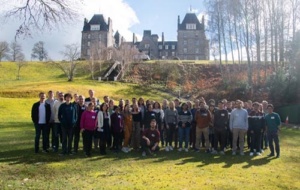Interrogating the Restless Earth
 Research Training Fund Travel Report – Justin Leung (2022, Environmental Research (NERC DTP))
Research Training Fund Travel Report – Justin Leung (2022, Environmental Research (NERC DTP))
Thank you to the Research Training Fund for supporting my attendance of the “Interrogating the Restless Earth” short course at Pitlochry, Scotland in March. This course was hosted on behalf of Seismological Parameters and Instrumentation (SPIN), an innovative training network funded by the European Commission to research seismic wave propagation and observation.
The workshop can be split into four topics: linear inversion, nonlinear inversion, advanced inference methods and machine learning. I went into the short course mainly to obtain a fundamental understanding of linear inversion and Bayesian inference, which are the main techniques involved in my research. Nonetheless, I have also found the other topics of the course equally as interesting, and I have gained a good understanding of them, which I can hopefully incorporate into my research. During each day, we would have lectures delivered by top tier Geophysics professors in the mornings, followed by a mixture of lectures and practical exercises in the afternoons. I really enjoyed the exercises, as they provided me good opportunities to solidify my understanding of the morning lectures and allowed me to explore the effectiveness of each technique and the feasibility of implementing these into my research. Apart from providing fundamental knowledge of techniques, these lectures also covered the latest computational research techniques in the geophysical field. One talk that I found particularly fascinating was the incorporation of the physics of a problem into a Monte Carlo simulation to drastically reduce the calculation time needed for high-dimensional problems.
This course was the first opportunity for me to meet the geophysical community as a PhD student. I was also able to develop friendships with other students over the week through working with them during practicals, having informal chats about science over meals and going for short walks together around the beautiful countryside. I was amazed to find out the range of different seismological research, all the way from numerical modelling of seismic wave propagation to landslide monitoring using fibre-optic techniques.
This short course has overall been an invaluable experience for me, in terms of learning fundamental skills needed for my research and making valuable connections with other students and professors. I would once again like to thank the Research Training Fund for supporting my attendance.
Find out more about the range of travel grants and scholarships available to assist Univ students on our Travel Grants page or read further travel reports.
Published: 22 June 2023
